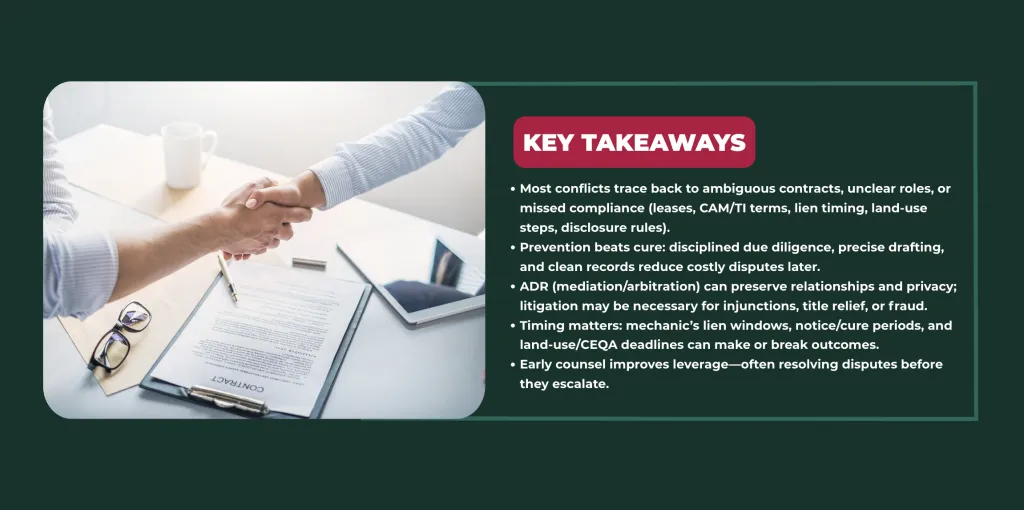California commercial real estate deals move fast—and small contract gaps can become months of friction and unexpected cost. One missed clause, a misunderstood lease term, or a stalled permit can snowball into a dispute that risks timelines, revenue, and relationships.
At ACE California Law, our mission is simple: protect your property, your peace of mind, and your future. Our real estate litigation team helps California owners, investors, landlords, tenants, and developers cut through conflict with practical, business-minded strategies. This guide lays out workable approaches to prevent disputes, contain risk, and resolve problems efficiently—whether through negotiation, ADR, or litigation.
Understanding the Nature of Commercial Real Estate Disputes
Commercial projects involve lenders, owners, tenants, brokers, contractors, and agencies—each with distinct goals and clocks. High stakes + complex documents = elevated risk. In California, spotting trouble early means tracking:
- Commercial lease provisions (rent escalations, options, CAM/TI allocations, maintenance/repairs)
- Mechanic’s lien rights (Cal. Civ. Code § 8000 et seq.) and strict recording/service timing
- Local zoning/land-use approvals and CEQA compliance
- Statutes of limitation (e.g., written contracts, fraud)
Good planning, disciplined maintenance records, and crisp governance keep disputes rare—and winnable.

Common Dispute Categories (and How to Defuse Them)
1) Lease Disputes
Rent increases, renewal options, TI schedules, CAM reconciliations, and repair/capital expense lines are frequent flashpoints. Clear exhibits (CAM methodologies, TI scopes, operating expenses) and notice/cure language help prevent nonpayment from spiraling into eviction or litigation. For enforcement, precise notices and cure opportunities are critical.
Practical plays: standardized billing calendars, audit rights with procedures, TI milestone definitions, service-level standards for building systems.
2) Easements & Access
Ingress/egress, shared parking, utilities, loading, and exclusive-use rights require exact legal descriptions, maps, and maintenance responsibilities. Ambiguity depresses value and delays operations.
Practical plays: record easements; attach diagrams; adopt joint-maintenance protocols and dispute ladders; align leases to recorded rights.
3) Boundary & Title Issues
Encroachments, conflicting surveys, overlapping easements, and defective legal descriptions stall financing and development.
Practical plays: early survey/title review, boundary line agreements, corrective deeds, lot-line adjustments, and, when needed, quiet title actions; coordinate with title underwriters early.
4) Fraud & Misrepresentation
Non-disclosure of contamination/defects, inflated rent rolls, or altered financials can justify rescission or damages.
Practical plays: robust diligence (Phase I, structural, roof/HVAC, ADA), tenant estoppels, financial audits, and reps/warranties with caps, baskets, and survival terms.
5) Partnership/JV Breakdowns
Vague authority, capital call rules, distributions, fee structures, and exits fuel internal fights.
Practical plays: operating agreements with approval matrices, capital-default remedies, buy-sell mechanics, related-party rules, and deadlock resolution (chair umpire, baseball arbitration).
6) Development, Zoning & Land-Use
Variance/permit denials, design review friction, and CEQA challenges delay or derail projects.
Practical plays: entitlement timelines, comment-response matrices, technical studies scoped to risk, early agency/stakeholder meetings, litigation contingency calendars.
7) Construction & Contractor Claims
Scope gaps, change-order fights, delay damages, and workmanship disputes are common.
Practical plays: milestone-tied lien waivers, performance/payment bonds, third-party inspections, objective punch-list procedures, weather/unforeseen conditions clauses, concurrent-delay rules.
8) Insurance & Risk Allocation
Coverage denials, additional insured status, and indemnity scope disputes arise across leases and construction.
Practical plays: align contracts with policies; verify additional insured endorsements; use indemnity clauses compliant with Cal. Civ. Code § 2782; maintain certificates and renewal tracking.
9) Post-Closing & Financing
After closing, parties fight over non-disclosure, escrow releases, prorations, taxes, and covenant compliance (DSCR, insurance, maintenance).
Practical plays: tight disclosure schedules, escrow instructions, true-up mechanics, covenant calendars, and early lender communication when metrics slip.
Choosing the Right Forum: ADR vs. Litigation
Many CRE contracts require mediation and/or arbitration before suit. Picking the forum is strategic:
| Factor | Mediation | Arbitration | Litigation |
|---|---|---|---|
| Speed | Fast | Moderate | Often long |
| Cost | Low | Medium | Higher |
| Privacy | Private | Private | Public record |
| Control | Parties craft deal | Arbitrator decides | Judge/jury decides |
| Appeals | N/A | Very limited | Available |
| Best for | Ongoing relationships, creative terms | Technical disputes needing neutral expertise, privacy | Injunctions, title relief, fraud, precedent, broad discovery |
Tip: Build ADR steps into contracts (good-faith mediation → binding arbitration), specify venue/rules (e.g., JAMS/AAA), and cap discovery to control cost/time.
Litigation Tactics That Contain Risk
When court is necessary, focused moves change leverage:
- Early case assessment (merits, damages, insurance, injunction potential)
- Targeted discovery (key custodians, structured ESI, protective orders for sensitive info)
- Motions to narrow claims/defenses; preliminary injunctions for possession/access or to stop interference
- Title remedies (quiet title/declaratory relief) to clear encumbrances blocking financing or sale
- Parallel insurance coverage actions to unlock defense/indemnity
Preventive Habits that Pay for Themselves
- Front-load diligence: leases, estoppels, SNDA, surveys, title, zoning/CEQA, building systems, financials.
- Governance calendars: rent/CAM cycles, option windows, lender covenants, lien deadlines, permit steps.
- Write it down: decision rights, cure periods, notice methods, fee-shifting, ADR path, and remedies.
- Keep the record clean: meeting notes, approvals, change orders, photos, inspection logs.
- Stay compliant: disclosure rules, tax/Prop 13 considerations, mechanic’s lien timing, insurance renewals.
FAQs
What’s the fastest way to de-escalate a lease dispute?
Audit the paper first: lease + amendments + exhibits (CAM/TI). Exchange reconciliations with backup, set a short mediation window, and agree on interim payments to stabilize cash flow.
When should I involve title counsel?
Immediately upon discovering encroachments, easement conflicts, or bad legal descriptions—before loan docs finalize. Early coordination with the title insurer preserves options.
How do I protect against construction delay claims?
Define excusable vs. compensable delay; require contemporaneous schedule updates; tie change-order pricing to pre-set unit rates; use DRBs/standing neutrals for quick rulings.
Is arbitration always cheaper?
Not automatically. It’s faster and private, but discovery and expert costs can still be significant. Draft the arbitration clause to limit discovery and set timelines.
Can insurance help with a construction defect claim?
Often, yes—depending on policy terms and endorsements. Align contract indemnity with coverage and tender early to all potentially responsible carriers.
Conclusion: Resolve the Dispute—Protect the Deal
Commercial disputes don’t have to derail your project or relationship. With the right plan—tight contracts, disciplined records, strategic ADR, and, when necessary, focused litigation you can contain risk and keep the business moving.
If a dispute is brewing—or already here ACE California Law can help you assess exposure, pick the right forum, and drive to a practical resolution.
📞 Call ACE California Law at (833) 342-2323 or visit our Contact Us page to schedule a consultation.
Protect your property. Protect your peace of mind. Protect your future.






